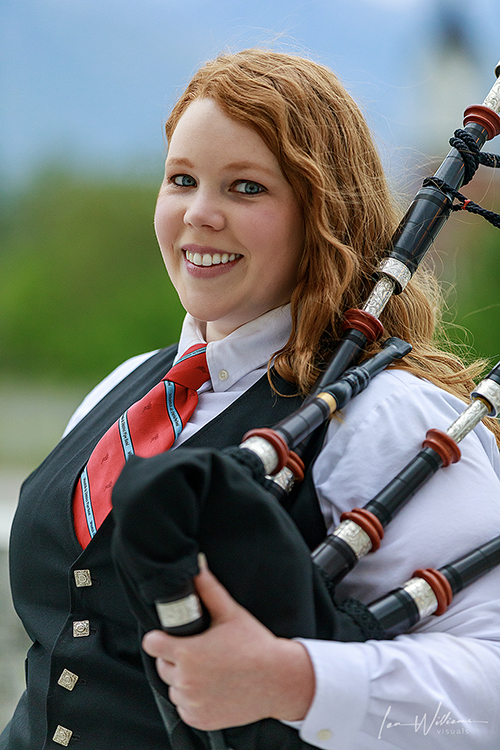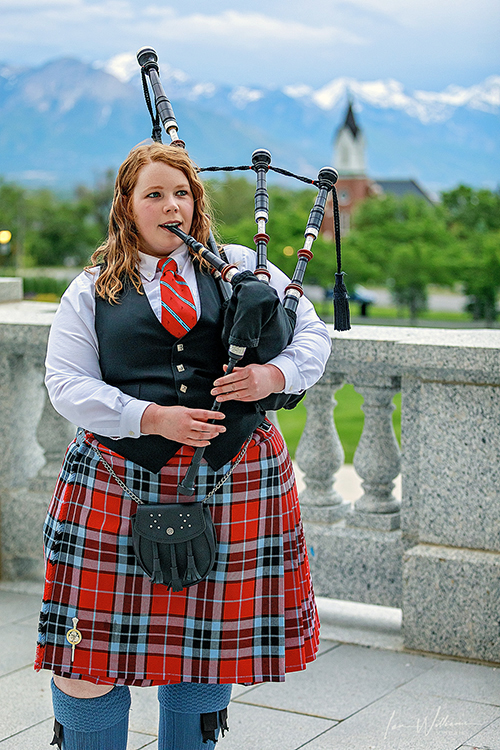You’re accessing archived content
This is archived content from the UIT website. Information may be outdated, and links may no longer function. Please contact stratcomm@it.utah.edu if you have any questions about archived content.
“I’m not going to sugarcoat this, bagpipes are a beast of an instrument.”
Kariann Hibbard — bagpipe soloist, 'beast' tamer
How bagpipes reached Scotland is almost as mysterious as what’s lurking in Loch Ness.
Some historians say they originated in ancient Egypt before journeying to Europe with invading Roman legions. Others cite the expansion of the British Empire in the 1700s, which included Scottish Highland regiments, or credit colonizing tribes from Ireland.
No matter how they got there, bagpipes are synonymous with Scotland — Kariann Hibbard’s adopted homeland.

Kariann Hibbard, business systems analyst, USS Product Management and Student Systems
When the business systems analyst in USS Product Management and Student Systems was only 1 year old, her dad was transferred to Holy Loch, a U.S. Navy base in Argyll, Scotland. After his retirement a few years later, back in Utah, “a Scottish festival just happened to take place at a park down the street from our house, and my mom eagerly took me and my sister to it,” Hibbard said. “After that first year, going to the festival became a tradition.”
Time went by, and after bouncing between schools, Hibbard landed at Murray High School. A close friend “happened to have a huge crush on some random dude who played the bagpipes, and this random dude had three random friends who also played the bagpipes.”
Begrudgingly at first, Hibbard attended every assembly, talent show, concert, and parade the random dudes played.
“It didn’t take long for me to decide that I loved the sound of the pipes and I wanted to play them,” she said. “At this point, I’d already tried and quit the piano, viola, violin, flute, and clarinet. It took three months of me begging my mom every day to let me take bagpipe lessons.” The 15-year-old Hibbard began to train with Dennis McMaster, who owned and operated the Celtic Center in Salt Lake City.
New students start the bagpipe on a “practice chanter,” which “looks and sounds a bit like a recorder.“ Once the chanter is mastered, which can take up to a year, they move on to the full bagpipe. Unlike a flute, however, you can't rent a bagpipe from a local music shop.
“There’s no inexpensive way to play a bagpipe,” Hibbard said. “Part of the reason I took a break from playing pipes is I was renting from my instructor, and when I got busy in college and stopped taking lessons, I lost my access to an instrument. I’ve since learned that many pipe bands have a few extra sets they can loan out to students who are transitioning to the full instrument but haven’t been able to purchase their own yet.”

Hibbard performs with the Wasatch & District Pipe Band at the Utah State Capitol
Hibbard had asthma to contend with, too.
“My asthma is usually well-controlled but flares up with allergies and colds. When this happens, I have to back off playing for a couple of weeks and slowly build back up to playing the full instrument. That said, I’m certain that playing the bagpipe has given me stronger and more resilient lungs.
“I’m not going to sugarcoat this, bagpipes are a beast of an instrument. ... You have to maintain physical conditioning to be able play it. Our bodies aren’t used to breathing with an additional external lung and it takes both mental and physical training for our bodies to learn to use that additional lung properly.”
Like other woodwind instruments, bagpipe players must master fingering and a system of reeds, as opposed to only one for a saxophonist or clarinetist. The style of bagpipe that Hibbard plays, the Great Highland Bagpipe, has four — the chanter, the loudest part that changes pitch when a player moves their fingers, and three drones that, according to Hibbard, "well, drone in the background.” As if not daunting enough, temperature and humidity can also affect the pitch of each reed.
Hibbard plays competitively. She started with the Salt Lake Scots from 2005-2008 before joining the Mesa Caledonian Pipe Band in 2010 while working on her master’s degree at Arizona State University. Upon returning to Utah, she joined her current organization, the Wasatch & District Pipe Band, in 2016, for which Hibbard is general manager — booking performances, handling public relations and internal communications, serving as liaison between executive leadership and music leadership, and running fundraising activities. She’s also a member of the Western United States Pipe Band Association.
Hibbard performs The Galtee Rangers - The Double F Dilemma. Because the bagpipe can only play nine notes, she said, "there’s only so much you can do. Double F Dilemma uses some false fingering to create an F flat and incorporates this additional note into the tune, resulting in an unexpected sound."
The United States has six competition “grades” for piper and drummer soloists — 5, 4, 3, 2, 1, and open — five is the level for novices and open is for professionals. Hibbard is currently a grade 2 soloist. Pipe bands, she said, follow a similar grading schedule without the open level. Her current organization features three bands — grade 5 for new learners, grade 4 for the beginner-intermediate level, and grade 2 for advanced musicians. The grade 2 band she performs with is the highest-ranked in the western U.S, and one of the 15 highest-ranked in the nation.
Ultimately, Hibbard would like to judge competitions, which means she would need to compete and win at the grade 1 level, a goal that she’s “willing to put in the effort it will take to achieve.”
To the dismay of performers and music lovers alike, 2020 hasn’t gone exactly to plan. The pandemic, Hibbard said, “flipped my bagpipe life upside down.” A band competition in Chicago, Illinois — canceled. Another in Enumclaw, Washington — also canceled. It was the same story with Memorial Day events, Fourth of July parades, and other local concerts (Living Traditions, Temple Square events, Bountiful Summerfest, and so on). As a soloist, COVID-19 curtailed her plans to compete in Sacramento, California, and Grand Junction, Colorado, too.
Her band canceled rehearsals in March but resumed in June once they “felt confident that we could abide by social distancing guidelines and maintain member safety. Now that it’s getting cold again, we’re in discussions about whether or not we hold rehearsals this fall and winter.”
Even in a normal year, she said, scouting out a practice space is difficult.
“Because bagpipes are so loud, I’ve had to be a bit creative about where I practice,” Hibbard said. “During the summer months, I usually practice in my backyard or at a local park. The cold months are much more challenging, especially because I like the people I live with!”
In previous years, a local church allowed her to use its space to practice in the evenings, and her band would rehearse at Bountiful City Park on Thursdays from Memorial Day to Labor Day, and at Discovery Gateway, to which they’re “forever grateful.”
Hibbard said one of the things she loves most about bagpipes — when played well — is they evoke feelings that range from wonderment to solemnity.
“I love that the bagpipe can provide solace at a funeral, excitement at a wedding, fear in battle, and joy at a dance or celebration,” she said.
Hibbard said people who disparage bagpipes have probably “never heard a good bagpipe.”
“Think of someone who’s just learning to play a violin. Does it sound good? Probably not. Does listening to that make you want to toss all violins in the fire? Of course not,” she said. “The problem is that we know what a good violin sounds like, but not everyone knows what a good bagpipe sounds like. ... If someone thinks they hate bagpipes, I challenge them to come listen to my pipe band. We’re the best band in Utah and among the highest-ranked in country, so I’m pretty sure we can change their mind.”
The Wasatch & District Pipe Band Grade 2, timed medley, 2018 Alma (Mich.) Highland Festival
Node 4
Our monthly newsletter includes news from UIT and other campus/ University of Utah Health IT organizations, features about UIT employees, IT governance news, and various announcements and updates.
